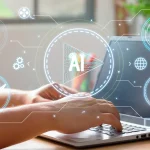Ethics in AI: Addressing the Challenges and Ensuring Fair Use

Artificial Intelligence has, until now, swept through industries and improved efficiencies while touching the lives of many. Still, with its growing influence, ethical issues raised by the new technologies have come to the fore. All systems of AI must be transparent and nondiscriminatory, be consistent with human values, and be able to respond to challenges to technology ethics in their use. This paper addresses key ethical issues involving AI, the challenges thrown up by the rapid development of AI systems, and measures that can be taken to develop responsible AI leading to trustworthy and equitable systems.
Ethics of AI
AI ethics involves sets of principles and practices that guide the development and use of artificial intelligence in manners demeaning to individual rights, foster transparency, and minimize harm. Its objective is to ensure AI systems benefit society while aligning with human values. As AI increasingly impacts a wide range of sectors from health and finance to education and criminal justice, the ethical responsibility of developers and users of AI continues to increase.
Key Reasons Why Ethics in AI is Important
- Absence of Bias and Prejudice: The AI systems, while being trained on data that expresses human biases, can inadvertently promote biased decisions taken in areas like hiring and lending to even law enforcement.
- Protection of Privacy: Many times, it takes immense data, containing an individual’s personal information; hence, this becomes a huge question with regard to its collection, storage, and usage.
- Accountability Guaranteed: With more and more tasks now performed by AI that were previously done by humans, accountability is called into question. Who can be held responsible in the case of errors or any unintended consequences of AI?
- Building Public Confidence: Ethics builds public confidence in AI, furthering adoption and driving innovation.
- Well-considered Ethical Frameworks in AI Development: Any progress in AI shall indeed be made innovative, useful, and equitable.
Ethical Issues in AI
But with great power and autonomy, AI also brings some special ethical challenges that indeed call for unceasing vigilance and thoughtful solutions.
1. Bias in AI Models
AI models, whether trained on big data or hedged against uncertainty, often pick up biases from society or human decision-making. If such biases are not treated, AI systems could continue discrimination unconsciously. For example, hiring algorithms, which are usually trained on past hiring data, can favor certain demographics over others.
- Challenge: The process of identifying and mitigating bias in AI models is tricky, with many biases being rather subtle and deeply embedded in data.
- Solution: Diverse and representative training datasets can help the identification of biases and perform regular audits of bias in AI systems.
2. Privacy and Data Protection
AI systems use extensive datasets that, very frequently, contain sensitive personal information. This brings a number of privacy risks: data collection, storage, and usage. Misuse of personal data results in privacy violations and reduces users’ trust.
- Challenge: The protection of privacy cannot be easily combined with the need for data, especially considering that AI models are much more precise when they are fed large amounts of information.
- Solution: Data anonymization and differential privacy are some of the privacy-oriented practices that could be used to protect information about users while still providing AI functionality.
3. Accountability and Transparency
The algorithms used in AI are sometimes described as “black boxes” because their decision-making processes are not easily understandable or explainable. This lack of transparency creates major challenges for accountability, especially in high-stakes domains such as healthcare, finance, and law enforcement.
- Challenge: Accountability for an accident occurring because of an AI system cannot be identified as most systems have obfuscated decision processes.
- Solution: Explainability in AI models, provided for example by explainable AI techniques, facilitates insight into how decisions are made and fosters accountability.
4. Job Displacement and Economic Impact
The automation by AI will displace workers from certain categories of jobs, and this may be so in industries with lots of repetition. While AI is also creating new job categories, the risk of economic disruption and unemployment is a valid concern.
- Challenge: Ensuring that efficiency driven by AI does not result in insecurity for the workers and overall instability in the economy.
- Solution: Reskilling and upskilling by governments and companies can help them move into new roles within the AI-enabled economy.
Ensuring Responsible AI Practices
Responsible AI development or implementation calls for a proactive design that is inherently transparent, with regard for ethical standards and adherence to regulations. Some best practices concerning responsible AI systems in development and implementation follow.
1. Adoption of Ethical AI Frameworks
A formal ethical framework in organizations provides guidelines toward responsible AI development and use. Such frameworks detail key principles, fairness, transparency, and accountability, which help developers create ethical AI systems.
Example: Google’s AI Principles and Microsoft’s AI Ethics framework epitomize commitments on the part of companies to do the right thing with AI. The concept enables ensuring ethical best practices in various projects of AI and guides on responsible technology development.
2. Making Transparency and Explainability Imperative
Transparency is central to obtaining public confidence and ensuring that AI is applied responsibly. By making the AI models more interpretable, developers can provide insight into how decisions are arrived at in areas involving healthcare, finance, or criminal justice. These are spheres where fairness cannot be compromised.
Explainable AI (XAI): XAI refers to the section of study resulting in a model that allows its decision-making processes to be understandable. It is to assist the end-user and stakeholders in gaining insight into AI actions to foster accountability.
3. Performing Routine Bias Audits
Regular auditing and monitoring can expose biases and discriminatory practices that may exist within AI systems. Bias audits involve testing AI systems using diverse data to detect biases, and then making changes to reduce any disparities uncovered.
Example: AI hiring platforms need to regularly audit their algorithms to make certain that no one demographic group is favored over others. This is one positive way to make sure that hiring is done in a fair manner and to foster diversity.
4. Using Data Protection Standards
Responsible AI has to take into consideration users’ privacy and data protection standards. The use of appropriate secure data handling, encryption, and anonymization techniques in view helps protect personal information and also allows AI to learn from it and improve.
Solution: Adopting data protection standards such as compliance with the General Data Protection Regulation for AI systems dealing with personal data makes sure that privacy rights are defended and user trust is upheld.
5. Building Inclusive and Diverse Teams
This will help reduce biases and enhance fairness, as diverse teams working on AI development can include multiple points of view in their work. If the development teams contain people from different walks of life, then they are most likely to identify biases that might have been left unnoticed.
Example: Involving diverse perspectives in the development process will make companies better positioned to develop an AI system that is more considerate and respectful toward various demographics and cultural values.
6. Encouraging Public and Industry Collaboration
Responsible AI development is supported by partnerships among industry leaders, governments, and public advocacy groups. Partnerships will facilitate sharing knowledge among stakeholders, establishing ethical conventions, and finding regulatory frameworks that ensure safety and equity in AI.
Solution: Free open-source projects and industry forums support collaboration in AI development, allowing the inclusion of a broad range of voices in the development of responsible practices.
Regulatory Approaches to AI Ethics
It thus requires various regulatory bodies and organizations to take initiative in developing a framework for the purposes of using AI responsibly. These range from governmental regulations to setting global standards that are laying the bedrock for ethics in AI.
- AI Act by the European Union: The EU is working on one of the first comprehensive AI regulations in the world. The AI Act classifies AI systems into risk categories and allows for stricter rules for applications considered high-risk to ensure safety, transparency, and ethical alignment.
- IEEE Global Initiative on Ethics of Autonomous and Intelligent Systems: This addresses standards in ethical AI development, with a focus on accountability, transparency, and fairness.
- UN SDGs: AI can potentially contribute to many of the SDGs of the United Nations, but developing responsible AI and reducing harm through AI requires that practices cascade along a path that does not create unintended negative impacts as a consequence of desirable goals. AI ethics help align the AI systems with the latter goals while promoting a positive impact on society.
These regulatory approaches are set to guide the development of ethical AI that shall enable companies and developers to account for responsible practices.
Conclusion
The rapid growth of artificial intelligence brings new opportunities and amplifies ethical risks. Only proactive measures-cumulative detection of bias, privacy protection, and more-will make AI fair and responsible. The core trust in AI will be developed and maintained through ethical frameworks developed and followed out, public collaboration, and setting up regulatory standards to ensure AI applications have a positive effect on serving humanity.
Meeting the challenges in ethics for AI will go a long way toward securing a future in which AI can enhance, rather than compromise, our shared values and aspirations. It is also how technology can remain a force for innovation and social good, with responsible AI practices.
Read also: How Practicing Mindfulness Can Enhance Your Physical and Mental Well-being











